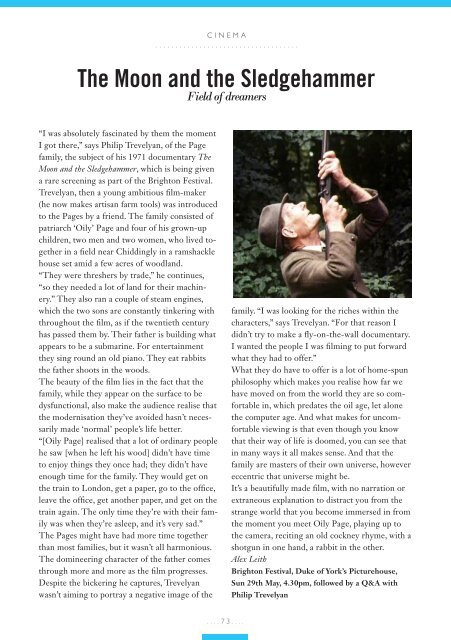Create successful ePaper yourself
Turn your PDF publications into a flip-book with our unique Google optimized e-Paper software.
CINEMA<br />
....................................<br />
The Moon and the Sledgehammer<br />
Field of dreamers<br />
“I was absolutely fascinated by them the moment<br />
I got there,” says Philip Trevelyan, of the Page<br />
family, the subject of his 1971 documentary The<br />
Moon and the Sledgehammer, which is being given<br />
a rare screening as part of the <strong>Brighton</strong> Festival.<br />
Trevelyan, then a young ambitious film-maker<br />
(he now makes artisan farm tools) was introduced<br />
to the Pages by a friend. The family consisted of<br />
patriarch ‘Oily’ Page and four of his grown-up<br />
children, two men and two women, who lived together<br />
in a field near Chiddingly in a ramshackle<br />
house set amid a few acres of woodland.<br />
“They were threshers by trade,” he continues,<br />
“so they needed a lot of land for their machinery.”<br />
They also ran a couple of steam engines,<br />
which the two sons are constantly tinkering with<br />
throughout the film, as if the twentieth century<br />
has passed them by. Their father is building what<br />
appears to be a submarine. For entertainment<br />
they sing round an old piano. They eat rabbits<br />
the father shoots in the woods.<br />
The beauty of the film lies in the fact that the<br />
family, while they appear on the surface to be<br />
dysfunctional, also make the audience realise that<br />
the modernisation they’ve avoided hasn’t necessarily<br />
made ‘normal’ people’s life better.<br />
“[Oily Page] realised that a lot of ordinary people<br />
he saw [when he left his wood] didn’t have time<br />
to enjoy things they once had; they didn’t have<br />
enough time for the family. They would get on<br />
the train to London, get a paper, go to the office,<br />
leave the office, get another paper, and get on the<br />
train again. The only time they’re with their family<br />
was when they’re asleep, and it’s very sad.”<br />
The Pages might have had more time together<br />
than most families, but it wasn’t all harmonious.<br />
The domineering character of the father comes<br />
through more and more as the film progresses.<br />
Despite the bickering he captures, Trevelyan<br />
wasn’t aiming to portray a negative image of the<br />
family. “I was looking for the riches within the<br />
characters,” says Trevelyan. “For that reason I<br />
didn’t try to make a fly-on-the-wall documentary.<br />
I wanted the people I was filming to put forward<br />
what they had to offer.”<br />
What they do have to offer is a lot of home-spun<br />
philosophy which makes you realise how far we<br />
have moved on from the world they are so comfortable<br />
in, which predates the oil age, let alone<br />
the computer age. And what makes for uncomfortable<br />
viewing is that even though you know<br />
that their way of life is doomed, you can see that<br />
in many ways it all makes sense. And that the<br />
family are masters of their own universe, however<br />
eccentric that universe might be.<br />
It’s a beautifully made film, with no narration or<br />
extraneous explanation to distract you from the<br />
strange world that you become immersed in from<br />
the moment you meet Oily Page, playing up to<br />
the camera, reciting an old cockney rhyme, with a<br />
shotgun in one hand, a rabbit in the other.<br />
Alex Leith<br />
<strong>Brighton</strong> Festival, Duke of York’s Picturehouse,<br />
Sun 29th <strong>May</strong>, 4.30pm, followed by a Q&A with<br />
Philip Trevelyan<br />
....73....


















